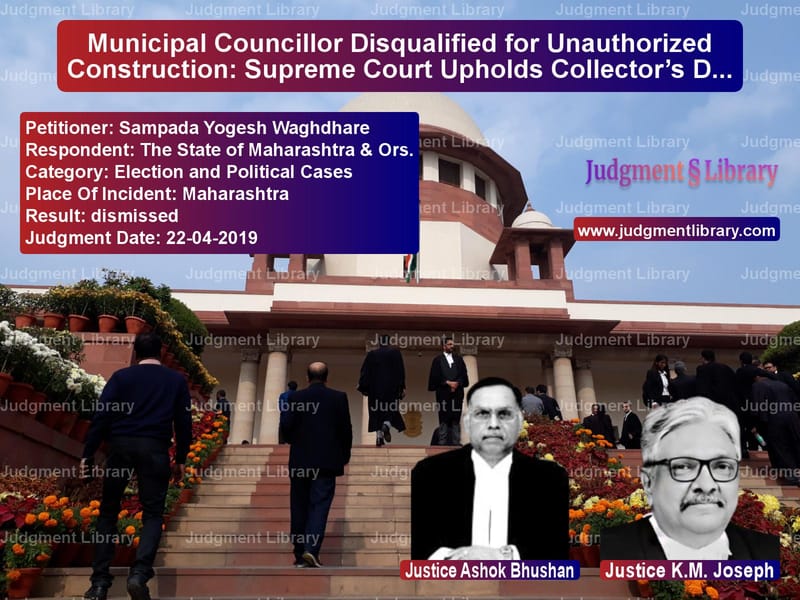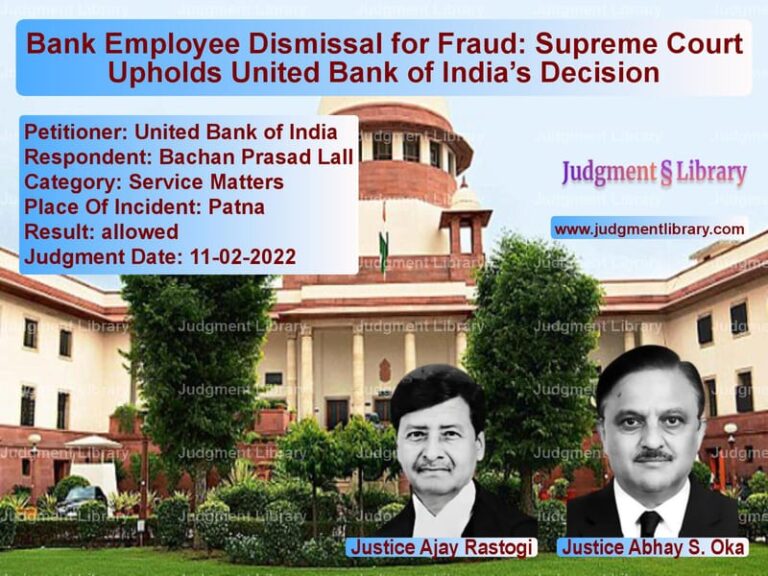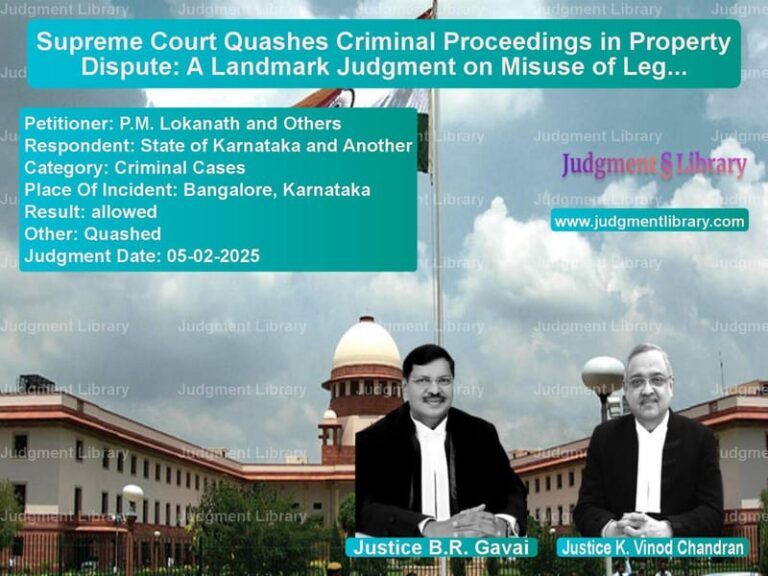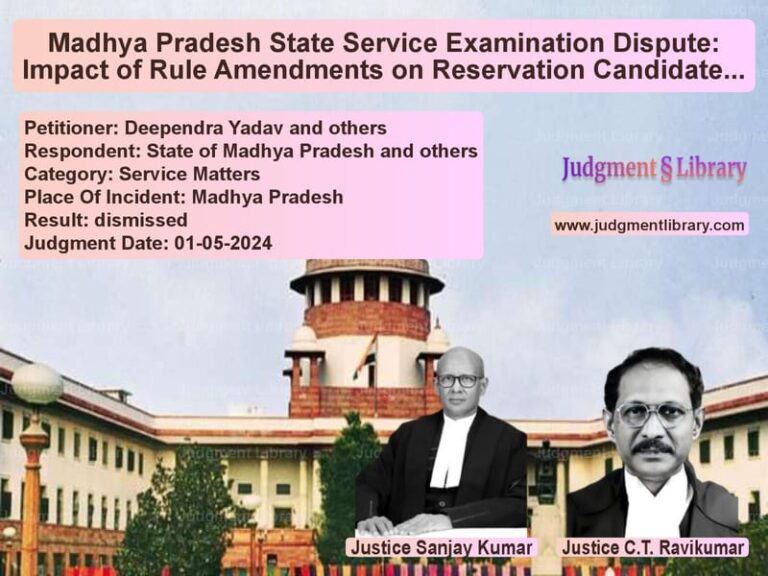Municipal Councillor Disqualified for Unauthorized Construction: Supreme Court Upholds Collector’s Decision
The case of Sampada Yogesh Waghdhare v. The State of Maharashtra & Ors. centered around the disqualification of a municipal councillor under Section 44(1)(e) of the Maharashtra Municipal Council, Nagar Panchayat, and Industrial Township Act, 1965. The Supreme Court upheld the disqualification of the appellant, ruling that unauthorized constructions by the councillor’s spouse warranted her removal from office.
This judgment clarifies the legal framework for disqualification of elected representatives in local bodies and highlights the legislative intent behind ensuring transparency and integrity in municipal governance.
Background of the Case
The appellant, Sampada Yogesh Waghdhare, was elected as a Municipal Councillor and later as the President of the Council on 11th February 2015. A complaint was filed against her alleging that her husband had carried out unauthorized constructions in violation of the Maharashtra Municipal Council Act and the Maharashtra Regional and Town Planning Act, 1966.
Based on this complaint, the Collector initiated proceedings under Section 44(1)(e) and passed an order disqualifying the appellant. Her appeal before the Divisional Commissioner was dismissed, prompting her to file a writ petition before the Bombay High Court. The High Court upheld the Collector’s order, leading to the present appeal before the Supreme Court.
Key Legal Issues
- Whether a councillor can be disqualified due to unauthorized construction by their spouse.
- Whether ‘deemed permission’ under Section 45(5) of the Maharashtra Municipal Council Act could exempt the councillor from liability.
- Whether temporary structures built by the councillor’s spouse constituted a violation warranting disqualification.
Arguments by the Appellant (Sampada Yogesh Waghdhare)
- The disqualification was based on unauthorized construction carried out by her husband, not by her personally.
- The structures in question had deemed permission, making them legally permissible under the law.
- The High Court failed to consider that only constructions violating specific provisions should lead to disqualification.
Arguments by the Respondents (State of Maharashtra)
- The law explicitly states that if a councillor, their spouse, or their dependent engages in unauthorized construction, disqualification follows.
- Even temporary constructions that violate town planning regulations are covered under the disqualification clause.
- The appellant failed to show any documentary proof that the constructions were legal or that permission was granted.
Supreme Court’s Observations and Judgment
The Supreme Court analyzed the scope of Section 44(1)(e) and the legislative intent behind ensuring compliance with municipal planning regulations.
Key observations:
- Section 44(1)(e) disqualifies a councillor if they, their spouse, or their dependent engage in illegal construction.
- The provision does not require the councillor to have direct knowledge or involvement in the unauthorized construction.
- Temporary structures also fall under the purview of the law if they violate town planning norms.
- Municipal councillors hold positions of public trust and must adhere to strict standards of conduct.
Key Judgment Excerpt:
“The policy underlying the provisions is to ensure that the highest level of probity is maintained by the Councillor and nearest members of the Councillor’s family. It does not require the Councillor knowing the fact of the construction being made by her spouse or dependent. We have to take the law as it is and fulfil the intention of the Legislature.”
The Court concluded that the appellant’s case was rightly dismissed by the High Court and upheld her disqualification.
Conclusion
This ruling reinforces the accountability of elected municipal representatives for the actions of their family members. The judgment underscores the necessity of strict compliance with town planning laws and discourages the misuse of power for personal or family benefits. By affirming the Collector’s decision, the Supreme Court has set a strong precedent for future cases involving disqualification of municipal councillors.
Petitioner Name: Sampada Yogesh Waghdhare.Respondent Name: The State of Maharashtra & Ors..Judgment By: Justice Ashok Bhushan, Justice K.M. Joseph.Place Of Incident: Maharashtra.Judgment Date: 22-04-2019.
Don’t miss out on the full details! Download the complete judgment in PDF format below and gain valuable insights instantly!
Download Judgment: Sampada Yogesh Waghd vs The State of Maharas Supreme Court of India Judgment Dated 22-04-2019.pdf
Direct Downlaod Judgment: Direct downlaod this Judgment
See all petitions in Public Interest Litigation
See all petitions in Constitution Interpretation
See all petitions in Legislative Powers
See all petitions in Judgment by Ashok Bhushan
See all petitions in Judgment by K.M. Joseph
See all petitions in dismissed
See all petitions in supreme court of India judgments April 2019
See all petitions in 2019 judgments
See all posts in Election and Political Cases Category
See all allowed petitions in Election and Political Cases Category
See all Dismissed petitions in Election and Political Cases Category
See all partially allowed petitions in Election and Political Cases Category







